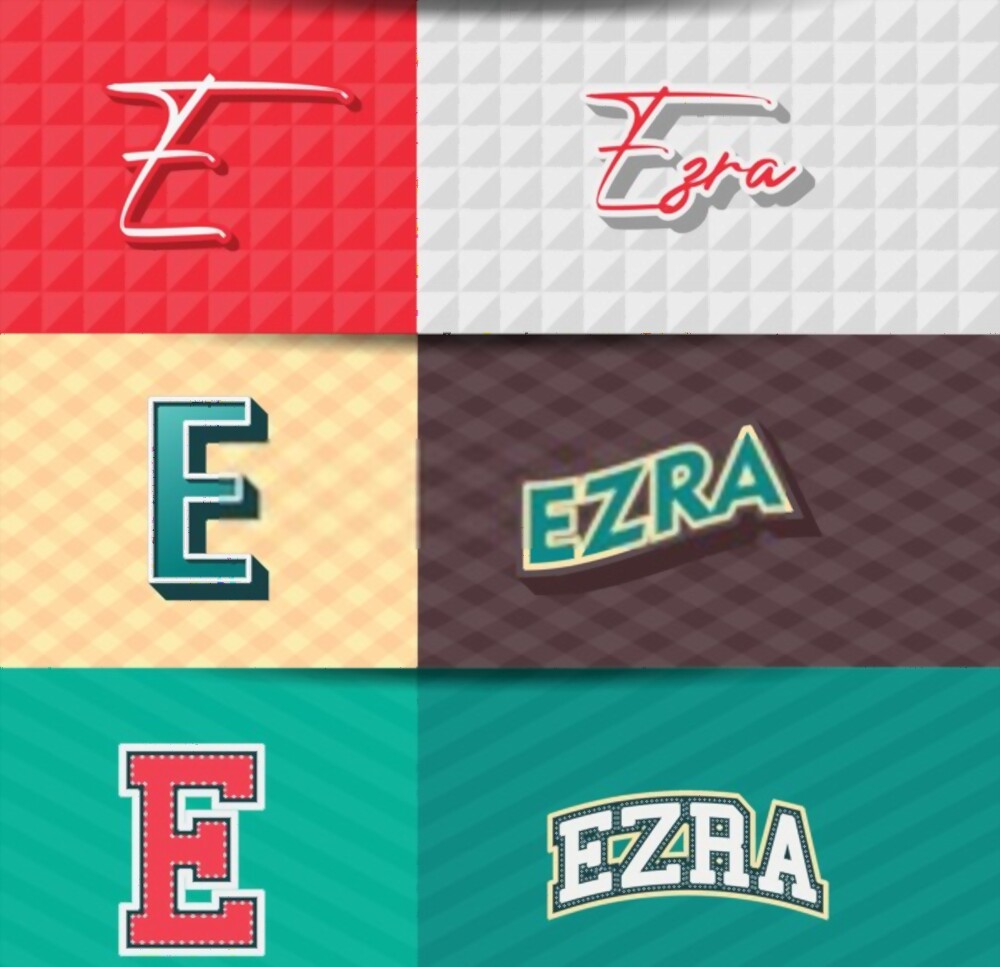Ezra is a Hebrew name that means “help.” It is derived from the word עזר, meaning “help” or “support.” This name was popularized in the Bible by Ezra, a priest who collected the scriptures and led people to believe in God. It is also the name of one of Jesus’ disciples. At last count, Ezra was ranked ۷۵ out of names given to baby boys in 2017.

Contents
Top 100 Ezra Name Meaning
1. Azra
Arabic name meaning “help.”
2. Ezzard
English occupational surname transferred to forename use, composed of the Germanic elements ezz “noble” and hard “brave,” hence “noble-brave.”
3. Ezra
Hebrew unisex name meaning “help.” In the Bible, Ezra was a priest who collected the scriptures and led people to believe in God. It is also the name of one of Jesus’ disciples. An Old Testament book is also named for him.
4. Esra
Turkish unisex name derived from the word “esr,” meaning “help.” This name is used in the Bible as a variant of Ezra.
5. Ezran
English name of obscure derivation and meaning, perhaps based on a Persian personal name, though it has also been suggested that it is a contracted form of Isaiah or Zechariah. It has been used as an independent given name in the United States since the 1970s.
6. Esrah
English variant spelling of the Arabic name إسراء meaning “help.”
7. Ezrah
Hebrew name meaning “help.” In the Bible, Ezrah was a priest who collected the scriptures and led people to believe in God. It is also the name of one of Jesus’ disciples.
In the Old Testament, it is also the name of a city in Northern Israel and capital of King Solomon’s kingdom.
8. Ezera
English form of the Hebrew name עֶזְרָא (Ezra) meaning “help.” This name is borne by a descendant of Judah in the Old Testament who was carried into Babylonian exile but later returned and rebuilt the Temple. He was also a scribe, an author, and a leader of Israel after its return from captivity.
9. Moses
English form of the Hebrew name עֶזְרָא meaning “help.” This name is borne by a descendant of Judah in the Old Testament who was carried into Babylonian exile but later returned and rebuilt the Temple. He was also a scribe, an author, and a leader of Israel after its return from captivity.
10. Edgar
English form of the Germanic name Adalhaidr meaning “noble guardian.” A famous bearer of this name was the Old Testament King and archetypal lawgiver King Edgar, who ruled from 959 to 975. He was an important patron of learning and literature, as well as being a key figure in the Norman conquest of England.
11. Edmond
French form of the Germanic name Eadmund meaning “noble protection.
12. Edom
Old English name meaning “red.” It was traditionally associated with the biblical nation of Edom, which was a multi-ethnically diverse region.
13. Edward
English form of the Germanic name Eadwulf, composed of the elements “ead” meaning “noble, excellent” and “wulf,” meaning “wolf.
14. Edmund
English form of the Germanic name Adalheid, composed of the elements “ead” meaning “noble, excellent” and “wulf,” meaning “wolf. A famous bearer of this name was the Old Testament King and archetypal lawgiver King Edmund, who ruled from 939 to 946. He was an important patron of learning and literature, as well as being a key figure in the Norman conquest of England.
15. Edison

A variant spelling of the English surname “Edison,” which is derived from the Scottish Gaelic “Mac Eidein” meaning “son of Edison.” It has been used as an independent given name since 1907.
16. Edsel
Anglicized form of the German name Eduardus meaning “man from Edo.”
17. Edson
Hebrew name meaning “he gives light.” This was an ancient Israelite personal name, borne by a grandson of Joseph.
18. Eduardo
Spanish name meaning “man from Edo.” It was a traditional name of the Spanish royal family, now given to the Spanish footballer.
19. Effie
Scottish Gaelic form of the Old English name Æþelberht meaning “noble ruler.” This was a modern Scottish form of an Old English personal name composed of the elements æðel “noble, ruler” and beorht “bright, famous.”
20. Elijah
Hebrew name meaning “my God is Yahweh.” A famous bearer of this name was a Hebrew prophet and an important figure in the Old Testament.
21. Elbert
Scottish Gaelic form of the Old English name Æþelberht meaning “noble ruler.” This was a modern Scottish form of an Old English personal name composed of the elements æðel “noble, ruler” and beorht “bright, famous.”
22. Elvin
Scottish Gaelic form of the Old English name Æþelwine meaning “noble friend.” This was a modern Scottish form of an Old English personal name composed of the elements æðel “noble, friendly” and wine “friend.”
23. Elwood
English surname transferred to forename use, derived from Old English words meaning “eagle wood.”
24. Emmet
From the Old Irish Gaelic “Éimhear” meaning “whole, healthy.” This was a first name or byname of one of the companions of St. Patrick. In Irish legend this name belonged to a son of Conn Cétchathach, who killed his uncle and ruled as king for 8 years until he died at the Battle of Magh Rath.
25. Ennio
Italian form of the Latin name Ennius (see Henry).
26. Enrique
Spanish form of the Germanic name Heinrich, meaning “home-ruler” or “ruler of the home.” This name was borne by a 9th-century Frankish king and an 11th-century king of Castile. It was used frequently by the Normans, who introduced it to England in the form Henric (see Henry).
27. Ender
Derived from the Old English word “ender,” meaning “gravel.” This name is used in reference to a character in the novel Enders Game by Orson Scott Card.
28. Enrico
Italian form of the Germanic name Heinrich, meaning “home-ruler” or “ruler of the home.” This name was borne by a 9th-century Frankish king and an 11th-century king of Castile.
29. Eric
Old Norse name composed of the elements “eir” meaning “army, man,” and “ric,” meaning “rule.” This is a common masculine given name in Norway.
30. Erikson
Old Norse name composed of the elements “eir” meaning “army, man,” and “ric,” meaning “rule.” The name was used as an alias for Eric.
31. Evan
Variant of the Teutonic name Weymar, which was derived from the words “wi” meaning “people” and “mar,” meaning “sea.” This was a Germanic royal name attested in the Old Testament.
32. Evelin
Scottish Gaelic form of the Old English name Æthelberht meaning “noble ruler.” This was a modern Scottish form of an Old English personal name composed of the elements æðel “noble, ruler” and beorht “bright, famous.”
33. Everardo
Spanish form of the Latin name Eurus meaning “eager,” or “spry.”
34. Ewan
Scottish Gaelic form of the Old English name Eoghan, composed of the elements eogh meaning “youth” and gan “kind, sort, species.”
35. Fabio
Italian and Spanish form of the Latin name Fabius, possibly meaning “having well-haird (or bearded) cheeks,” or else derived from a word meaning “to fashion.” In Roman mythology, this was a praenomen that was also used as a personal name.
36. Fabel
Old English name meaning “fairy tale.” In Shakespeare’s time this was a given name for boys, taken from the story of the fairy-tale hero Taliessin.
37. Fabian
Italian form of the Latin name Fabius, possibly meaning “having well-haird (or bearded) cheeks,” or else derived from a word meaning “to fashion.
38. Ezekiel
Original Hebrew spelling of the name Ezekiel, composed of the elements “ez” meaning “God is my strength” and kabbeb (“ekeph”), meaning “man.” This was a biblical name, meaning “God has strengthened.”
39. Fausto
Italian and Spanish form of the Germanic name Futhark, composed of the elements futhari (“fate”) and kampari, meaning “fighter.” It was frequently used in medieval times for sons born at dawn.
40. Adam
From the Hebrew name ʼĂdām meaning “earth” or “red.” In the Old Testament Adam was the first man created by God. The name was also borne by, a son of Henry II of England, who became King of Scotland in 1249. It was not used as an independent name until the 17th century, and it did not come into general use until after World War I.
41. Benjamin
From the Hebrew name Benyamin meaning “son of the right hand.” In the Old Testament Benjamin was the twelfth and youngest son of Jacob and the founder of one of the twelve tribes of Israel.
42. Jacob
From the Hebrew name Yaʻaqov, which is derived from “yaqob” meaning “to follow by bending,” in reference to a wrestler who has been thrown to the ground and is following his opponent by bending his knees.
43. David
Originally a Hebrew name meaning “beloved.” In the Old Testament David was the second king of Israel and a son of Jesse.
44. Frank
From the Latin name Franciscus meaning “from France.” This was the name of an early saint, who is said to have been martyred in Switzerland under Diocletian. He is sometimes identified with Francis Xavier, one of the founders of the Jesuit order, who was one of many early Jesuit missionaries sent to India.
45. Ephraim
From the Hebrew name Efron meaning “fruitful.” In the Old Testament Ephraim was an elder son of Joseph, and one of the twelve tribes of Israel.
46. Samuel
From the Hebrew name Shemuel, which means “name of God” and was derived as an abbreviation of Samuel. In the Old Testament Samuel was a prophet and a judge of Israel, who anointed kings and was known as God’s seer.
47. Christopher
From the Greek name Khristóphoros meaning “Christ bearing. In the New Testament Christopher was a saint who is traditionally said to have carried the baby Jesus over a stream.”
48. Daniel
From the Hebrew name Daniyel meaning “God is my judge.” In the Old Testament Daniel was one of the captives taken to Babylon by Nebuchadrezzar, but his ability to interpret dreams made him a favorite of the king.
49. Ephraim
From the Hebrew name Efron meaning “fruitful.” In the Old Testament Ephraim was an elder son of Joseph, and one of the twelve tribes of Israel.
50. Leon
Old French name taken from a mythological figure named Leon, who was the son of Priam and Hecuba, and father by Camilla of Hector. In Arthurian legend, Leon was one of Arthur’s fourteen knights.
51. Ira
Old English name taken from a mythological figure named Ira, which means “devotion” or “worship.” In Arthurian legend Ira was one of Arthur’s twelve knights. He is also considered the brother of Helias, and the uncle of Sir Launcelot.
52. Rafael
Spanish form of the Latin name Raphaël meaning “God has healed.” In the Old Testament this was the name of an Old Testament prophet and musician who played a lyre for King David.
53. Lewis
From the Welsh name Llywelyn, which was derived from llwyd meaning “gray” or “bluish-grey.” In Arthurian legend Llewelyn was a king of Gwynedd and father of Gwenhwyfar.
54. Jonah
From the Hebrew name Yoḥanan meaning “dove.” In the Old Testament Jonah was a prophet who disobeyed God’s commands and was swallowed by a whale.
55. Mikael
Biblical name, meaning “who is like unto God?” In the Old Testament, this was the name of one of the archangels who led God’s army against Satan in the War in Heaven. The Anglicised form is Michael.
56. Jordan
Old English name whose origin is disputed. It is either from the Welsh name Dŵr meaning “water,” or from a Latin word meaning “flowing down.” In the bible, this was the name of a river which separated the lands of Israel from those of Jordan.
57. Rubén
Spanish form of Hebrew Reuben (meaning “behold a son”), altered by association with Latin ruber (“red”).
58. Levi
Old English name derived from the Hebrew name Levi meaning “pious.” In the Old Testament this was the name of an ancestor of Aaron.
59. Dios
Spanish form of God, originated in the Vulgar Latin forms Deius, Deus and Divus, and derives from Proto-Romanic Dīvs (meaning “god”) or Dīvus (meaning “divine”).
60. Fynn
Old English name, taken from the Old Norse name Finnr, which was a compound of faen (meaning “battle”) and ǫrn (“shield”), meaning “battle-shaker.” In the Anglo-Saxon Chronicle this was the name of a king who reigned in Hampshire in 849–845.
61. Guile
From an old French word for wile, possibly meaning “cleverness” or “devise.
62. Nathan

Hebrew name meaning “he gives knowledge.” In the Old Testament he was one of David’s seers, and one of the book of sonnets.
63. Nathaniel
Hebrew name meaning “bound one,” from the Hebrew nawthamach meaning “to be set free.” In the Old Testament he was a prophet whose father was a friend of King David.
64. Ysidro
From the Latin name Isaac, which means “he laughs. In the Old Testament he was a king of Edom and one of the twelve tribes of Israel. He was also the father of Azariah, whose mother was named Ysalme.
65. Ysaac
Hebrew name meaning “he laughs.” In the Old Testament this was the name of two sons of Abraham and one son and prophet of Isaac.
66. Otto
From the German name Otto meaning “wealthy.” In the Old Testament this was the name of a duke of Saxony and brother of Henry, known as Holy Roman Emperor.
67. Wesley
From various English names meaning “bringer of peace” or “sanctuary.” In Arthurian legend Wesley was one of Arthur’s twelve knights. He is also considered the brother of Sir Uwaine and Sir Launcelot.
68. Noah
From the Hebrew name Naḥum meaning “comfort.” In the Old Testament Noah was a righteous man who was spared by God during a great flood.
69. Patrick
From the Latin name Patricius, which is derived from pater (“father”) and originally meant “of noble birth.” In the New Testament this was the name of an early Irish saint and missionary, best known for bringing Christianity to Ireland.
70. Reuben
From the Hebrew name Reuben meaning “behold a son.” In the Old Testament Reuben was a firstborn son of Jacob and an ancestor of Joseph.
71. Samson
From the Hebrew name Shemesh-amshay, which means “sun” or “sunrise.” In the Old Testament he was an Israelite judge who lost his strength when his hair was cut.
72. Saul
From the Hebrew name Sh’lô, which means “asked for, desired.” In the Old Testament this was the name of several kings of Israel and Judah—the first king whose reign was recorded in the Bible.
73. Alexander
Greek name meaning “defender of men.” In the New Testament this was the name of a missionary and one of Paul’s companions.
74. Caleb
From the Hebrew name Qelab, meaning “dog” or “wolf.” In the Old Testament this was the name of Joshua’s brother and a family head who was one of twelve spies sent by Moses to scout out Canaan.
75. Gideon
From the Hebrew name Gid’în meaning “battle.” In the Old Testament this was the name of a judge who led Israel to victory against a Midianite army.
76. Gregory
From a Greek name meaning “watchful,” derived from grapsos (“vision”). In the New Testament this was the name of an early missionary for whom St. Paul wrote a letter that became well known after being cited in the fourth-century epistles of St. Jerome.
77. Jesse
From a Hebrew name meaning “dew,” from the verbal root yashar (“to be wet”). In the Old Testament this was the name of an ancestor of King David.
78. Milo
From the Greek name Milōn meaning “strong.” In Arthurian legend Milo was a famed knight of the Round Table. After performing a series of brave adventures, he was incarcerated by Joseph of Arimathea for seven years for having struck down a knight who had insulted the Virgin Mary.
79. Matthew
From the Hebrew name Mattathiyah, which means “gift of YHVH” or “gift of God. In the New Testament this was the name of an apostle who wrote the book of Matthew.
80. Meir

Hebrew name meaning “hear” or “thoroughfare.” In the Old Testament this was the name of a man who led a tribal rebellion against King David.
81. Moray
Old English name, which originated in various Old Germanic names meaning “sea-marsh. In the Old Testament this was the name of a man who killed his brother with a hook and became the fifth king of Scotland.
82. Maul
Old English name which originated in various Old Germanic names meaning “beetle.” In the Old Testament this was the name of a man who lived around three hundred years before Christ, and is believed to have invented water-lifting machines. He is also considered to be the first settler of Scotland, building a number of forts in that country.
83. Oliver
Old English name, which originated in various Old Germanic names meaning “wolf.” In the Old Testament this was the name of a man who lived during the reign of David and was one of the twelve spies sent by Moses.
84. Raphael
Old Italian name which is Greek for “God heals” or “God’s healer.” In Arthurian legend Raphael was an archangel who, after being expelled from Heaven, became an angel of fire and one of the chief architects in Heaven.
85. Peter
Greek name meaning “flesh.” In the New Testament this was the name of an apostle and one of Jesus’s inner circle.
86. Richard
Old Germanic name from various Old Germanic names meaning “army.” In Arthurian legend Richard was a king who fought against Edward I in the Third Crusade (see Cyprus).
87. Abigail
Hebrew name meaning “father’s joy.” In the Old Testament this was the name of David’s second wife and an ancestor of King David.
88. Solomon
Old Greek name meaning “crowned” or “honoured.” In the Old Testament he was a man of wisdom and prominence who is best known for building the Temple in Jerusalem and writing many books of theology.
89. Sampson
From a Hebrew name meaning “given by God. In the Old Testament this was the name of one of Israel’s judges.
90. Hannah
From the Hebrew name Channah meaning “favour.” In the Old Testament this was the name of one of the wives of Elkanah, who gave birth to Samuel. Hannah was also a prophetess who is thought to have written part of the Song of Songs.
91. Joanna
From the Hebrew name יוֹנָה (Yônâh), meaning “Jehovah has been gracious.” In the Old Testament this was the name of one of David’s wives (see Bathsheba).
92. Mordecai
From the Hebrew name מַרְדֵּקָי (Mardêky), meaning “swiftness. In the Old Testament this was the name of a man included in Esther’s genealogy and a cousin of her husband, King Ahasuerus.
93. Leah
From the Hebrew name לֵאָה (Lê’âh), which means “weary.” In the Old Testament this was the name of Jacob’s first wife and an ancestor of King David.
94. Naomi
From the Hebrew name Nô’mî, meaning “pleasant.” In the Old Testament this was the name of a wife of Elkanah and an ancestor of King David.
95. Ruth
From the Hebrew name רוּת (Ru’th), meaning “gleaning toil.” In the Old Testament this was the name of a woman who became part of Naomi’s clan as one whose husband had died childless because she refused to marry another man.
96. Rebecca
From the Hebrew name רָחַם (Râchâm), meaning “from Recham.” In the Old Testament this was the name of a woman from Moab who was a descendant of Manasseh who became part of David’s family.
97. Ezra Ames
Old English name, which originated in various Old Germanic names meaning “raven.” In the Old Testament this was the name of one of Israel’s twelve spies.
98. Ezra Taft Benson
Old English name derived from several Old Germanic names with the first element meaning “beetle.” In the Old Testament this was the name of Ezra’s father, who was also called Ezra.
99. Elkanah
Hebrew name meaning “god is my life.” In the Old Testament this was the name of two men in whose genealogies included the story of Hannah and Samuel. Elkanah was also a minor prophet who wrote part of the Book of Judges.
100. Ezra Jack Keats
Old English name, which originated in various Old Germanic names meaning “stick-point.” In the Old Testament this was the name of Ezra’s great-grandfather.